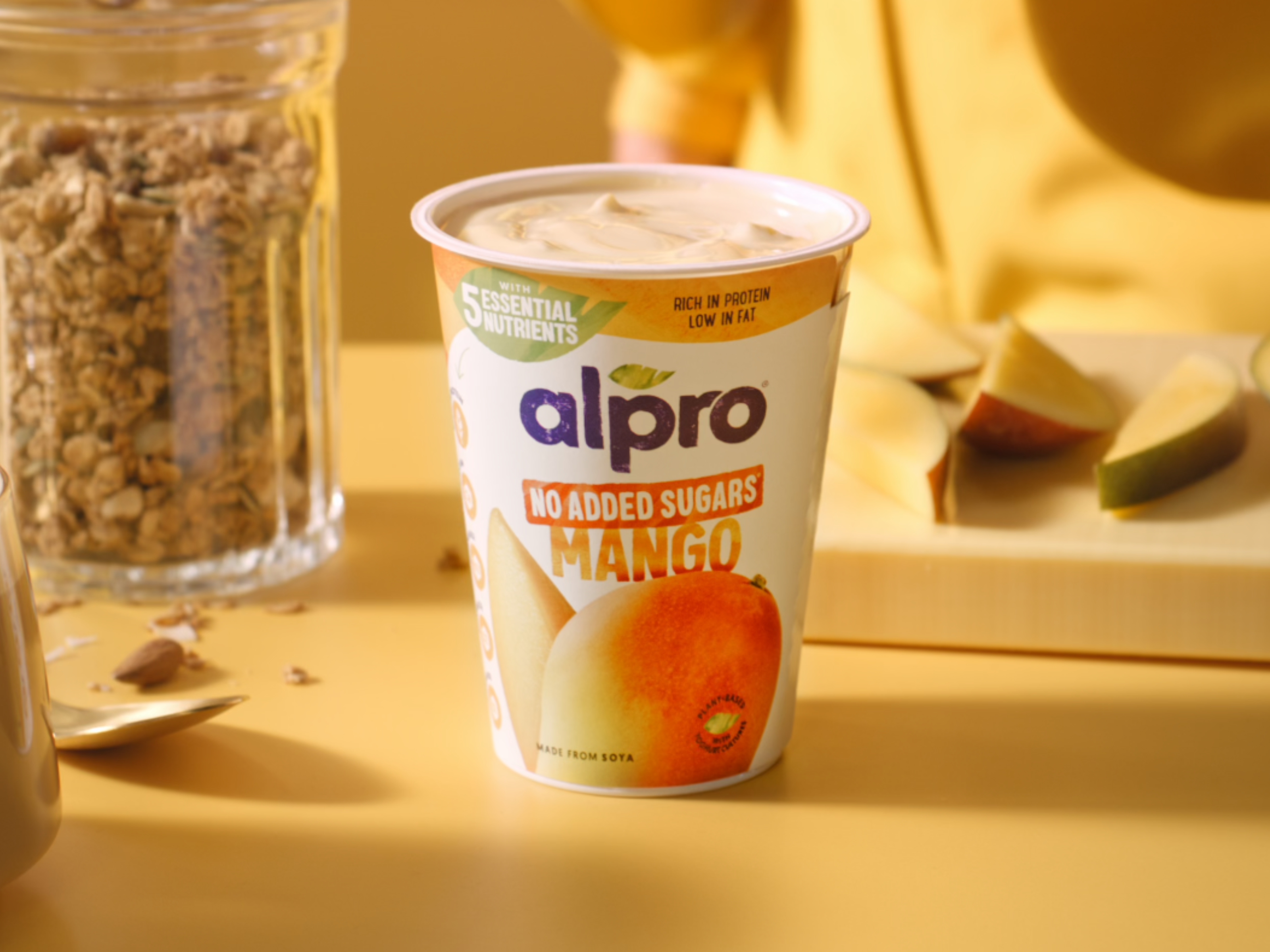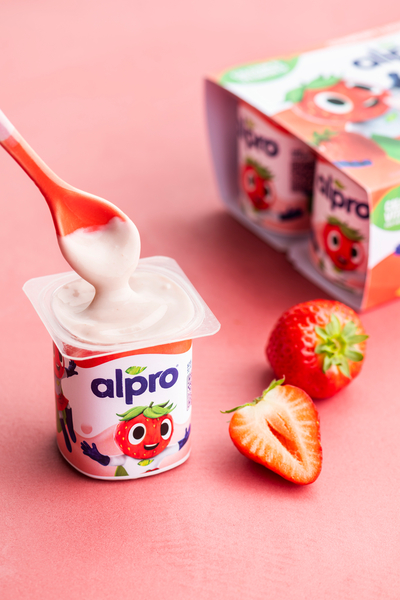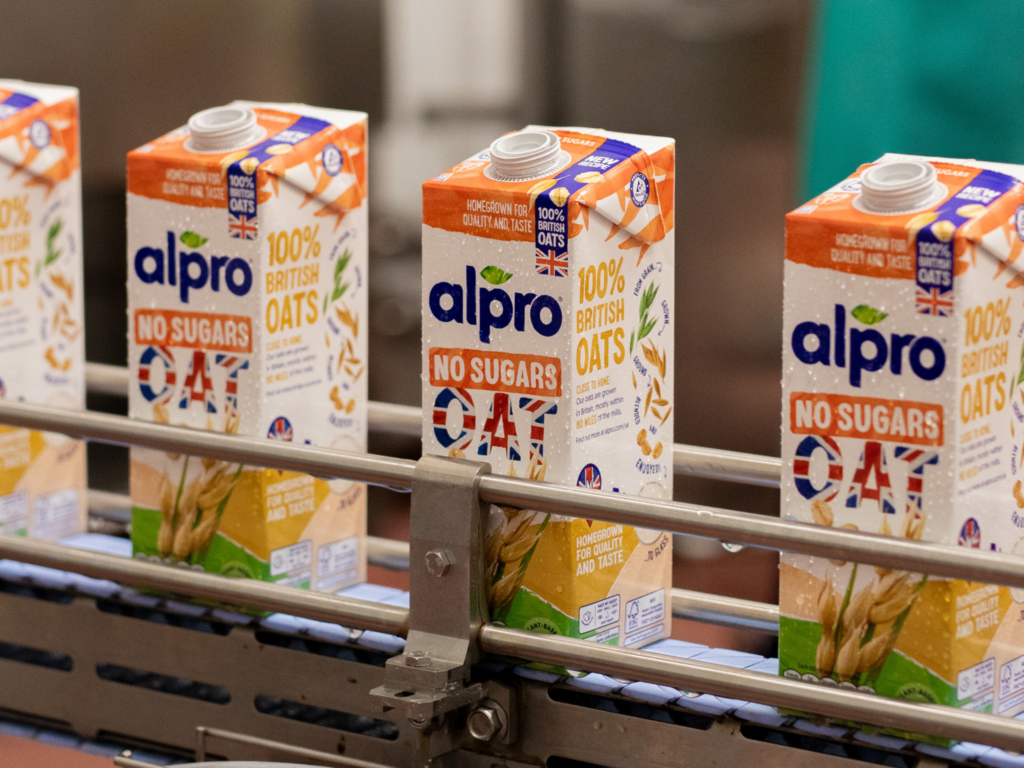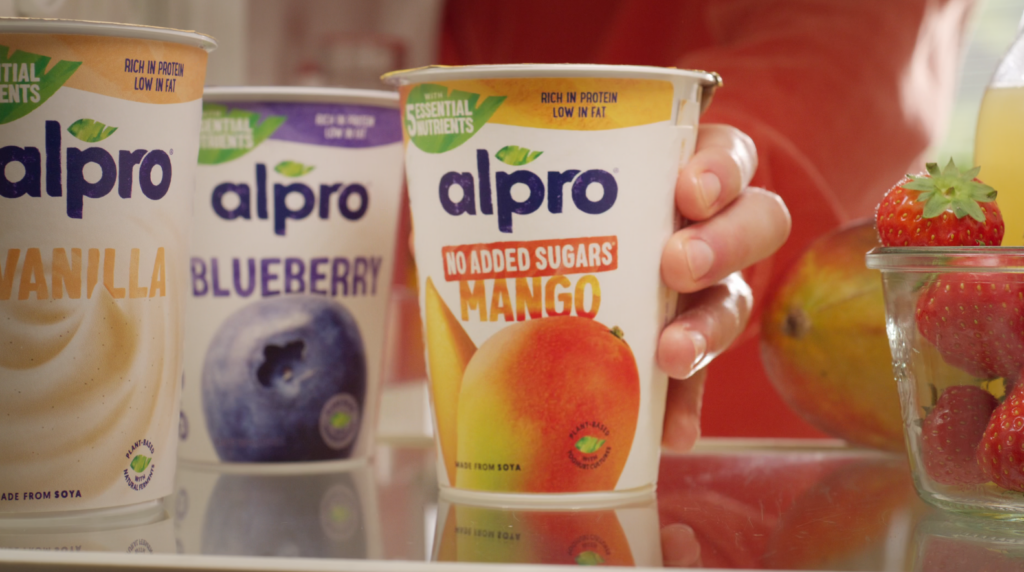
Plant-based dairy leader Alpro has witnessed sales of both its milk and yoghurt alternatives grow this year, as it focuses on young consumers and new sensory experiences.
It’s been eight years since Danone acquired Alpro in a $12.5B takeover of organic food producer WhiteWave. In the years since, Alpro has become the leading brand for both Danone and the plant-based dairy market in Europe.
Guillaume Millet, the European VP of plant-based food for Danone, calls it a “massive asset” for the French giant to have its arms in both the legacy and plant-based dairy sectors, noting that both are equally strategically important.
Danone, he tells Green Queen, has offered “a lot of support”, starting from R&D: “I have all the top scientists from Danone working on the plant-based category when it comes to fermentation, for example. We are accelerating in plant-based yoghurts, which is very much a core area of expertise for Danone.”
He adds: “In terms of money, funds, advertising and so on, we are equally – if not more – helped than other categories. So I think that it’s a major priority for Danone.”
How Alpro’s plant-based milk and yoghurts are driving growth

Financially, this year has been “excellent” for Alpro. “In Europe, we’re growing [by] high single digits, and we are gaining market share under two categories,” says Millet.
“For plant-based beverages, we are leaders, and gaining market share significantly, both in retail and away-from-home coffee shops,” he adds. “The major acceleration this year is especially coming from plant-based yoghurts, where we grew by double digits.”
Alpro holds 54% of the share in Europe’s vegan yoghurt market now, a three-point increase from last year, and these products make up 40% of its retail value.
Millet says one of its best-performing markets is Spain, which he claims has one of the highest per-capita consumption rates for milk alternatives globally. “We have just, again, become market leaders in [non-dairy milk] beverages. And in plant-based yoghurts, we’re accelerating like never before, growing at 30% and already the market leader [with a 65% share],” he highlights.
It’s why Spain is the brand’s fastest-growing market, although the UK remains its biggest. Where can it do better? “There are plenty of opportunities in France,” he says. “That’s probably the market where we still have the biggest potential. With the size of Danone in France, we are still under-indexing. It’s not that it’s not performing, but it’s the biggest opportunity.”
He continues: “So now we are accelerating a lot, but still, the potential is big. We can probably triple or quadruple the size that we have.”
Come for the health benefits, stay for the taste

In 2023, Alpro unveiled a packaging refresh that put the ingredients, taste descriptors, and health claims front and centre.
“It worked very well,” says Millet, noting that it helped reconnect the brand with younger consumers. “We saw an acceleration of our market share and penetration among Gen Z and Gen Alpha. It’s really linked to this new appeal.”
It especially worked on its yoghurts, where the taste barrier is a bit higher. Non-vegans who felt the products weren’t for them began embracing them and finding them tasty. “We have one of the highest repeat rates in the [overall] yoghurt category,” says Millet.
It does seem that Alpro’s marketing hinges on health as a gateway for consumers and taste to keep them coming back. “We’ve started to add nutrients to make sure that there is no excuse, and taste reformulation is ongoing, so that they are always the best in the market,” says Millet. “If you crack taste and health, you’re a rockstar.”
Indeed, a major barrier to entry to the plant-based category is the perception that consuming these products would mean missing out on certain key nutrients. This is what led to Alpro’s new 5 Essential Nutrients range, for which it partnered with Swedish popstar Zara Larsson.
“It’s one of the reasons we reviewed what we provide with our products, to see what we need to dial up, in communication and product, to make sure that consumers don’t miss any [nutrients] or misunderstand what we deliver,” says Millet.
Europeans face a greater risk of developing an iodine deficiency (especially if they’re fully vegan), prompting calls from the WHO to fortify plant-based milks with the mineral. Alpro’s own research shows that around a third of consumers are concerned about a lack of iodine and vitamin D intake in their diet.
Depending on the formulation, products in the 5 Essential Nutrients range contain a blend of plant protein, calcium, iodine, and vitamins B2, B6, B12, D2, and E.
Why Alpro launched a kid-centric range

In July, Alpro forayed further into child nutrition with a kid-centric range of low-sugar milk and yoghurt alternatives in the UK, responding to research that showed ‘less sugar’ and ‘no added sugars’ are important nutritional benefits in products for 71% of parents.
According to Millet, parents who had kids with intolerances and allergies, or just wanted more options, felt there was a gap in the non-dairy market for children. Alpro ended up receiving scores of requests from customers to design kid-specific products.
“The new generation, they want to have options, and we want to make sure that those consumers are used to the taste of plant-based and can really switch between plant-based and dairy proteins,” he says.
“Kids had no option so far – either dairy or nothing,” he adds, although several ‘Growing Up’ milk alternatives are available in the UK, including Alpro’s own. The kids’ range, however, is “healthier than most of the ones on the market”, according to him, and will be expanded to other European markets eventually.
How’s it performing so far? “We just launched two or three months ago, so [right] now, we are above our expectations. So starting very well, super happy,” says Millet.
“The name of the game is the repeat [purchases], and just making sure that the first trial stays and becomes a habit. And for that, we need just a little bit more time to make sure we are having success.”
New categories in the works, though not cheese or hybrids

So what does the future look like for Alpro? Could we see the brand expand into new categories?
“The priority is still to grow where we are: win on beverages, win on yoghurts first,” outlines Millet. “And then yes, we are looking at other segments that are close by.”
He suggests that Alpro has a “very strong pipeline of innovation” and is working on other categories and launches on a regular basis. However, he rules out a move into vegan cheese.
“We don’t want to go to something that is too far away. We’re just trying to see how we can expand progressively. But we don’t want to go to segments that we don’t really master at all,” he explains.
Another category Alpro will stay away from is blended proteins, with brands now combining dairy with plant-based ingredients in milk, cheese, and butter products.
“All the serious dairy producers are looking at that. From the dairy angle, I think it makes a lot of sense to start blending with a more sustainable protein base. And now consumer acceptance is starting to rise,” says Millet.
However, he adds, there’s no proven success of these products, despite many attempts. Labelling is a challenge too – consumers may not be drawn to the term ‘hybrid’. For Danone, blended dairy isn’t a priority right now.
Young consumers ‘speak plant-based faster than their mother tongue’

Looking at the larger picture, Millet believes the vegan dairy industry has a bright future in store, thanks to younger generations who are “plant-based-native” from the get-go.
“They speak plant-based faster than they speak their mother tongue,” says Millet. But though he remains “fully confident” about the category’s success, he outlines that these consumers also want more out of these products.
“They want to have clean labels. They really want to understand the benefits. They want to make sure that the products are full of nutrients. And, probably the main point, that they bring a new, different sensory experience,” he says.
Plant-based alternatives began by trying to imitate the sensory attributes of animal proteins. But the industry needs to go beyond that and offer healthy products with additional sensory benefits. This is why Alpro is focusing on its core ingredients like oats and almonds, which aren’t meant to mimic dairy milk, and why it pulled the This Is Not Milk product from the UK this year, Millet confirms.
The EU could vote to ban the use of meat-like terms on vegan alternatives this year, replicating its existing legislation for non-dairy products. Millet calls it a “sad battle” between the plant-based and animal protein worlds.
“This really is totally useless,” he says, suggesting that it isn’t the way to safeguard either of the categories. “It’s defocusing [them] from what they need to try to achieve: delivering better products that bring value.”
Millet reveals that while the non-dairy labelling ban has had no impact on Alpro’s sales, it has created a lot of complexity and triggered costs for the plant-based sector. “It really is not good for the industry, not good for consumers, not good for anyone,” he says.
“It could be really great if we spark this discussion and stop [the ban] to make sure that consumers are not being fooled.”
The post Alpro Bets on Young Europeans Amid ‘Excellent’ Growth in Plant-Based Milk & Yoghurt Sales appeared first on Green Queen.
This post was originally published on Green Queen.